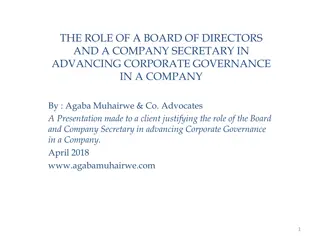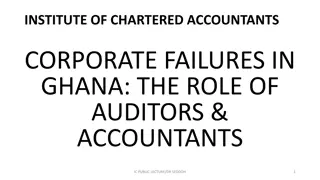Corporate Governance in Ethiopia - Legal Implications and Policy Framework
Emerging separation of ownership and control in Ethiopian share companies has brought attention to the outdated corporate governance provisions within the Commercial Code. Various scholars highlight the inadequacies in the legislative framework, shareholder protection laws, and the role of boards of directors in Ethiopian corporations. Recommendations for reform and modernization are being proposed to align with international standards.
Download Presentation

Please find below an Image/Link to download the presentation.
The content on the website is provided AS IS for your information and personal use only. It may not be sold, licensed, or shared on other websites without obtaining consent from the author.If you encounter any issues during the download, it is possible that the publisher has removed the file from their server.
You are allowed to download the files provided on this website for personal or commercial use, subject to the condition that they are used lawfully. All files are the property of their respective owners.
The content on the website is provided AS IS for your information and personal use only. It may not be sold, licensed, or shared on other websites without obtaining consent from the author.
E N D
Presentation Transcript
CORPORATE GOVERNANCE IN ETHIOPIA Lecture 11
MANDATORY READINGS Fekadu Petros, Emerging Separation of Ownership and Control in Ethiopian Share Companies: Legal and Policy Implications, Mizan Law Review, Vol. 4 No.1, March 2010 Hussien Ahmed Tura, Overview of Corporate Governance in Ethiopia: The Role, Composition and Remuneration of Boards of Directors in Share Companies, Mizan Law Review, 2012, Vol. 6, No. 1 Minga Negash, Rethinking Corporate Governance in Ethiopia, University of Witwatersrand, 2008 Tewodros Meheret, Governance of Share Companies in Ethiopia, Business Law Series, AAU School of Law, Vol. IV, 2011 Hussein Ahmed Tura, Reforming Corporate Governance in Ethiopia: Appraisal of Competing Approaches, Oromia Law Journal, Vol. 3, No. 1, 2014 www.nbe.gov.et, for legislations concerning governance of financial companies; banks, insurance, and micro-finance institutions
MANDATORY READINGS Fekadu Petros, Ethiopian Company Law, (Far East Trading PLC), 2012 (Amharic) Banking Proclamation No 592, Insurance Proclamation 746/12, Micro Finance Proclamation No 626 Ethiopian Commercial Code, Arts 347-428
OVERVIEW OF CG IN ETHIOPIA The issue of CG in Ethiopia is introduced along with the promulgation of the Commercial Code in 1960. The Comm. C has provisions that are applicable yet, but, which are old and not updated to the demanding situation of the country and the stage CG reached at international level. There are emerging researches conducted by different writers, driven by the emergence of separation of ownership and management, which show the problems of CG provisions under the Comm. C.
OVERVIEW OF CG IN ETHIOPIA Minga Negash said that weak corporate laws are serious voids for complying with international corporate governance standards. Asnakech Getnet finds out that overall standard of CG of private banks in Ethiopia is inadequate due to the poor legislative framework, political party s involvement in business enterprises, inadequate shareholder protection laws and the ineffective judicial system as well as absence of an organized share market in Ethiopia.
OVERVIEW OF CG IN ETHIOPIA Hussien Ahmed said that the legal framework governing company governance in Ethiopia does not sufficiently address issues related to the roles, composition and remuneration of boards of directors in share companies. Fekadu Petros said that the law should be reviewed in order to protect the rights of (minority) shareholders. Furthermore, he said that the board of directors needs to be divided in to supervisory and executive directors. Tewodros Meheret said that here are loopholes and are not sufficient to address the changing needs and problems of emerging corporations. He said that an essential factor for the success of companies is effectiveness and efficiency of their corporate governance system.
OVERVIEW OF CG IN ETHIOPIA The above conclusions of writers are among many works undertaken on Ethiopian regime on CG. Further, there are many other works by disciplines such as economics, accounting, and management about CG in Ethiopia. Most of the researchers tried to compare the Ethiopian system of CG with other countries and international standards, models, principles and codes of CG. All are similar in their conclusion and recommendation as they require the government to revise provisions of the Comm. C dealing with CG.
THE LEGAL REGIME GOVERNING CORPORATE GOVERNANCE IN ETHIOPIA The concept of CG, though introduced as early as 1960, is a new issue to Ethiopia even at present. Unlike some other countries which have independent code of CG, Ethiopia does not have one. Rather, Ethiopian regime on CG is found in the 1960 Commercial Code and other special laws. The special laws include proclamations relating to banking, insurance and microfinance businesses, commercial registration and business licensing proclamation, investment proclamations, directives of different government organs, and others. (For this reason, Tewodros Meheret said that there are two legal regimes of CG in Ethiopia.)
ORGANS OF SHARE COMPANIES Companies organs include; Board of directors General Manager Auditors Shareholders (meetings) A brief account of each of the organs of Companies will be discussed below. 1. 2. 3. 4.
BOARD OF DIRECTORS Governing provisions: Article 347 - 367. These provisions deal with, among other things, the appointment, the remuneration, the removal, the duties and responsibilities, the liability of board of directors (BoD) and the protection of minority shareholders.
APPOINTMENT OF BOD Members of the BoD, as per Article 347 (1), are elected from among the members of a share company. BoD is the ultimate managing body of companies in Ethiopia. It is a non-executive organ of the company which governs the company. It is distinguished from the executive body (general manager) of the company that performs the day to day activities of the company.
COMPOSITION OF BOD The Commercial Code and other relevant laws do not require share companies to have independent non-executive directors. The law does not define the independence of BoD. In fact, the Code provides under Article 348 (4) that the general manager may not be a director. In relation to this article there is a discrepancy between the Amharic and English versions of the Code. Though Article 347 (1) of the Commercial Code stipulates that only members of the company may manage, this stipulation seems outdated.
COMPOSITION OF BOD The financial sector has special rules on the composition of directors. Banking Business Proclamation No 592/2008 under Article 15(3) and NBE Directive No SBB/49/2011 prohibit general manager/s or CEOs from concurrently holding the positions of CEO and membership in the board of directors. The new NBE Directive (i.e., No.SBB/49/2011) specifically prohibits any (permanent or contractual) employee of banks to serve as a member in the board of directors of any bank.
QUALIFICATION OF DIRECTORS The Code does not set down any qualifications to be met to which would be elected directors should satisfy. This creates a room for the election of an incompetent person to become a director. However, it should have been better if the elected directors have financial, technical or legal knowledge and specialization in the area of operation of the company.
QUALIFICATION OF DIRECTORS However, in relation to banks, insurance companies and microfinance institutions, the NBE has issued a directive dealing with the appointment and selection criterion for membership in the board of directors. The Directives set selection criteria such as education, employment, age, financial soundness and etc.
DUTIES AND RESPONSIBILITIES OF BOD Directors duties and responsibilities, and their powers are provided under Articles 362 and 363 respectively. The duties of directors as provided under Art. 362 are so wide for which there is no need to restate here. The power of directors is emanated from the law, MoA or AoA and the resolutions of shareholders meetings as clearly provided for under Article 363(1) of the Commercial Code.
REMUNERATION OF DIRECTORS The OECD and other international and national instruments have provided for the remuneration owed to directors. In Ethiopia, Article 353 of the Commercial Code regulates the matter. Hussein raises two potentially controversial issues in relation to remuneration of directors. Whether the remuneration provided by the Code is mandatory in cases where the AoA are silent. On the amount of remuneration set by the law (i.e., 5-10% share of annual profit), Article 353(4), and its application in financial share companies. 1. 2.
REMUNERATION OF DIRECTORS The survey conducted by the NBE considers that the remuneration paid to the directors of banks is excessive and causing conflict of interests among shareholders. As a result, the NBE has issued Directives No.SBB/49/2011 in accordance with Article 14(4) (e) of the Banking Business Proclamation No.592/2008 which authorizes it to issue directives on the maximum remuneration of a director of a bank, to address disputes and create industry peace and good corporate governance among financial institutions.
REMUNERATION OF DIRECTORS The directives limit the remuneration of individual private bank directors to Birr 50,000.00 in one operating year, and a monthly allowance of Birr 2,000.00. Banks are also prohibited from paying directors any benefits, in cash or in kind, in addition to the set annual amount. The failure to implement the directives could earn a non-complying bank a penalty of 10,000 Birr and make it liable for criminal and civil suits.
MINORITY SHAREHOLDERS PROTECTION One of the purposes of effective CG is to protect minority shareholders from abuse, whether from managers with little ownership interest or controlling shareholders who dominate management. It includes: Voting by proxy: Arts. 398 (1) and 402. The minimum percentage required for shareholders to call general meetings is 10% of the capital under Art. 391 (2). Pre-emptive right of shareholders to buy newly issued shares: Arts. 345 (4) and 470 (1). 1. 2. 3.
MINORITY SHAREHOLDERS PROTECTION Normally, there are two alternative mechanisms of minority rights protection: cumulative voting, and minority representation in the board of directors a. b.
MINORITY SHAREHOLDERS PROTECTION However, the Comm. Code lacks to have: the right to proxy voting by mail; the derivative suit mechanism, and cumulative voting or proportional representation of minorities on board of directors
CONFLICT OF INTEREST Conflict of interest between directors and a company is dealt with in three articles of the Commercial Code, i.e. Articles 355-357. The Code prohibits any conflict of interest between the directors and a company and for that reason puts strict provisions. Under Art. 355 of the Commercial Code, the law imposes a restriction on directors by stating that they may not be partners with joint and several liability in rival companies nor compete against their companies either on their own behalf or on behalf of third parties.
CONFLICT OF INTEREST In the second place, the dealing between directors and companies is subject to the provisions of Article 356. Accordingly, any dealings made directly or indirectly between a company and a director shall receive the prior approval of the board of directors and notice shall be given to the auditors. Lastly, Article 357 (1) provides that directors may not contract loans with the company. In addition, directors may not obtain an overdraft in current account or have any obligation guaranteed in respect of business transacted with third parties.
LIABILITY OF DIRECTORS The BoD acted and govern the company as an agents of the shareholders. As a result, directors are liable to the shareholders. Directors are also liable to the creditors and the company. Art. 364 and 365: Liability to the company: this is based on the agency theory Art. 366: Liability to third parties/creditors: this is based on the stewardship theory Art. 367: Liability to shareholders
LIABILITY OF DIRECTORS REMEDIES: Administrative: applying to the board itself for correcting, to call meetings (391(2)) and then to punish or remove (Art. 397(2) the director. However, it will be impractical that the board will entertain its own case. In this case, the involvement of regulatory organs, like NBE and MoT, is required and have a great role 1.
LIABILITY OF DIRECTORS 2. The court: Criminal remedies: e.g. crimes relating to administration of foreign exchange, money laundering, tax evasion, Breach of trust, Art. 675-677; possession of unexplained property, Art. 419; of the Criminal Code or pursuant to Procl. No 780/13 Civil remedies: can be divided in to two depending on the case.
LIABILITY OF DIRECTORS Derivative Action: is an action by the shareholder on behalf of the company against the board or its employees. The beneficiary in this case is the company not the shareholder taking the action. It has two advantages: (1) deference effect, means that it warns the board to cause damage to the company; (2) compensation, compensates the company against any damage it sustains. 1.
LIABILITY OF DIRECTORS The following are the grounds of derivative damage: Violation of fiduciary duties Negligent company governance Unlawful benefit of directors Failure to preserve company s asset Conflict of interest
LIABILITY OF DIRECTORS 2. Direct Action: is an action that a shareholder sought either the board or the company for a personal damage he incurred. Here the beneficiary is the shareholder because he is the one suffered from damage. There is no precondition for direct action; as a result a shareholder may proceed with out requiring any permission from the board, the company or the court.
LIABILITY OF DIRECTORS The ground for direct action include, among other things, problems related to: Right to vote, The right to inspect registers of the directors and shareholders, Right to share of profits/dividend Any measures affecting enjoyment of his share in the company Fraud that particularly affects the shareholder
LIABILITY OF DIRECTORS How derivative action and direct are distinguished? It is difficult, however the general practice to distinguish the two in other countries include: Direct harm Special injury: separate and distinct injury Duty owed 1. 2. 3.
LIABILITY OF DIRECTORS UNDER THE COMM. CODE NB: Directors are liable to the company, the shareholders, the creditors and third parties (creditors) Art. 364: directors are jointly and severally liable. Art. 365: derivative action (?): the precondition here is that an action to proceed against directors had to be supported by shareholders holding 20% of the capital of the company. This is a very low requirement. Art. 367: direct action It does not need the permission of anyone It has no precondition
LIABILITY OF DIRECTORS Judicial practice: Cassation File No: 23389, Volume 5. In this case the FSC CD ruled that shareholders can directly institute an action against directors. Further, the court ruled that what is expected from the shareholders, under Art. 367 is to show that they are damaged by the acts of directors.
SHAREHOLDERS 3/14/2025 Shareholders 1. Are members of a SC who have subscribed to the capital of the company either at the time of establishment or later and who have been issued shares of the company. Not all founders are shareholders. If they subscribe, will be shareholders. Role: the ultimate power of the mgmt affairs of the company falls on the general body of shareholders. It has a power to pass any resolution in respect of the company or its business. They can be appointed as a member of board of directors or as a manager in the company. Belaynew Ashagrie 35























